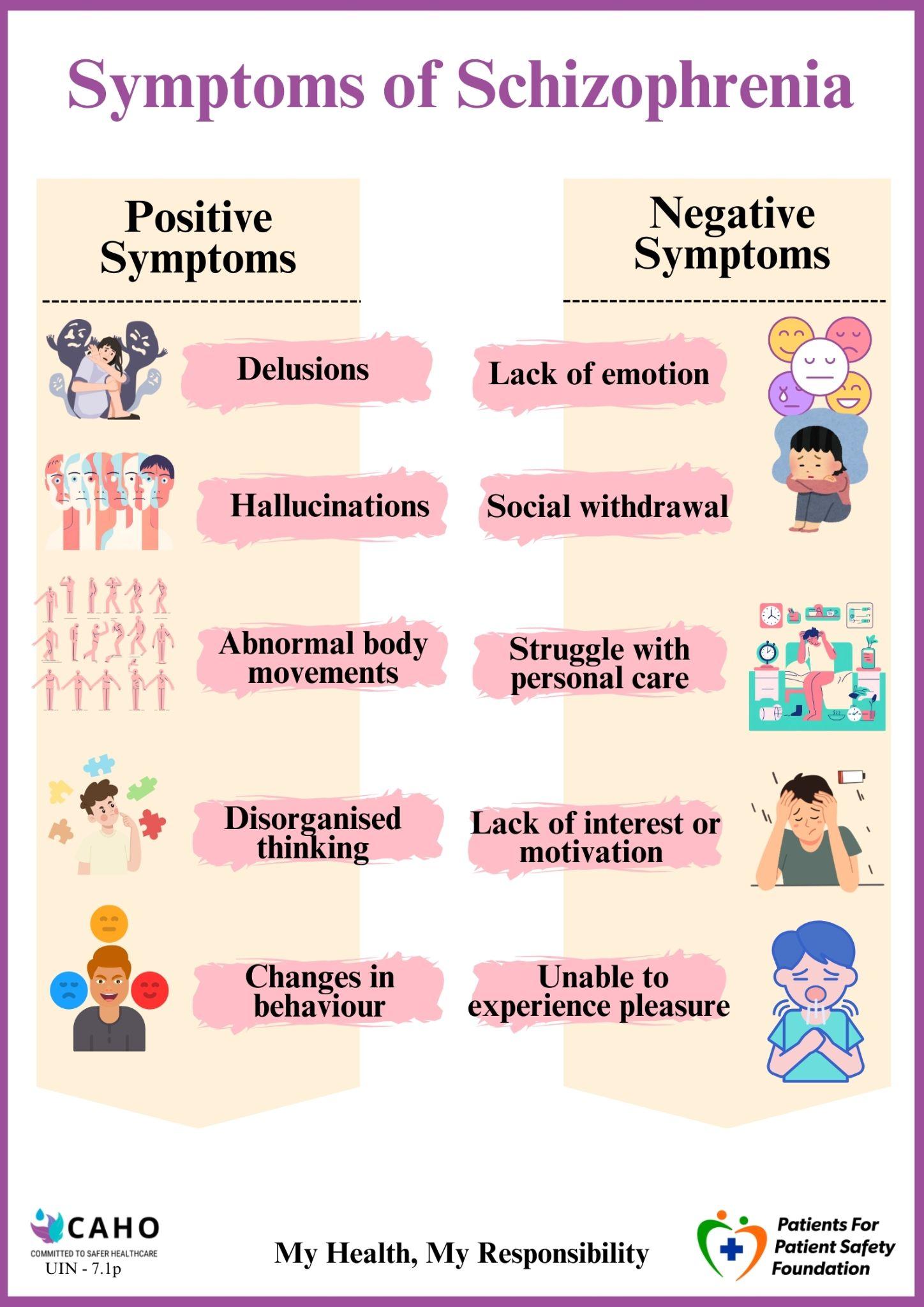Understanding Schizophrenia: Symptoms, Causes and Treatment Options
What is it:
Schizophrenia is a serious mental health condition that affects how a person thinks, feels and
behaves. People with Schizophrenia may seem like they have lost touch with reality, experiencing
symptoms like hallucinations, delusions, and disorganised thinking. It is important to approach this
condition with empathy and understanding, as those affected often face significant stigma and
misunderstanding. Lifelong treatment is often necessary but early intervention can help manage
symptoms and improve long-term outcomes.
Symptoms of Schizophrenia:
Schizophrenia involves a range of problems with thinking (cognition), behaviour and emotions. Signs
and symptoms are divided mainly into positive and negative symptoms. Positive symptoms are more
noticeable and disruptive while negative symptoms can be more subtle and gradual and may go unnoticed
until they become severe.

What causes Schizophrenia:
There is no known cause of Schizophrenia. Instead, it may be caused by a combination of factors:
- Disruptions in brain cell communication chemicals like dopamine and glutamate.
- Irregularities in brain development before birth are influenced by conditions like gestational
diabetes and malnutrition.
- Loss of connections between brain regions may play a role.
- Exposure to infections, autoimmune diseases affecting the brain, and prolonged extreme stress.
- Issues during pregnancy and birth, such as emergency caesarean sections and maternal malnutrition.
- Heavy use of recreational drugs, especially marijuana during adolescence, is associated with a
higher risk, though the exact relationship is not fully understood.
How to diagnose Schizophrenia:
Mental Health Professionals go by process by elimination and check mental health conditions and
ensure that symptoms are not related to substance misuse, medicine or a medical condition. Diagnosis
of Schizophrenia may include:
- Physical examination and Tests: A variety of tests designed to rule out medical
conditions with similar symptoms, as well as screenings for substance abuse. MRI or CT scans might
be requested to rule out brain abnormalities or other neurological conditions.
- Psychiatric evaluation: A detailed assessment and judgement by a Mental Health
Professional of the patient's mental status including general appearance, mood, speech, thought
process, behaviour, delusions, hallucinations, substance use and risk of violence or suicide.
Talking to the patient’s family and friends to know more about the patient’s educational, social and
family background may also help diagnose the condition.
Treatment options for Schizophrenia:
Treating Schizophrenia involves a combination of medication, therapy and lifestyle changes. Continued
support from immediate family and friends is crucial to help the affected person. Early treatment can
help avoid or ease frequent relapses.
- Medication: Antipsychotics are commonly used to regulate brain chemicals and
block certain communication pathways. Do not self-medicate, miss or adjust doses independently.
Always seek professional guidance or treatment from
Mental Health Professionals..
- Psychotherapy: Talk therapy methods like Cognitive Behavioural Therapy (CBT) can
help cope with and manage the condition. Some other therapies are reserved for cases where standard
treatments prove ineffective.
- Psychosocial rehabilitation (PSR): It focuses on improving daily functioning,
teaching vocational skills, social interactions and community integration of the patient. Programs
also involve family education and support to help individuals manage symptoms and improve their
quality of life.
According to Dr M. Sarada Menon, a well-known Indian
psychiatrist and the founder of the Schizophrenia Research Foundation (SCARF)
“Psychiatric treatment is, “Minimizing Illness” and “Rehabilitation is Maximizing Health”.
Role of caregivers and families in managing Schizophrenia
condition for affected individuals:
- Providing a feeling of understood and supported environment.
- Ensuring the individual takes prescribed medication regularly.
- Observing changes in behaviour or mood to catch early signs of relapse.
- Learning more about schizophrenia so you can understand it better and provide better support. Stay
updated on treatment options and resources available for managing.
- Establishing a stable daily routine for a sense of normalcy.
- Encouraging social and community interaction to reduce isolation and enhance well-being.
- Ensuring everyone involved knows how to respond in severe episodes.
- Collaborating with mental health professionals for a comprehensive approach to treatment and
management.
- Assisting with future planning including financial and legal matters for long-term stability.
Tips to manage Schizophrenia:
While there is no known way to prevent Schizophrenia, you can manage or cope with Schizophrenia with
the following care tips:
- Take your medications as prescribed, regularly attend scheduled
appointments and promptly report
any changes in your symptoms or side effects to your healthcare provider.
- Avoid alcohol and recreational drugs as they can worsen symptoms and
interfere with treatment
effectiveness.
- Share your feelings with caregivers, friends and family members so they
can provide emotional
support.
- Practice relaxation techniques to reduce stress such as mindfulness,
meditation, yoga or
deep-breathing exercises. Engage in activities and hobbies that bring joy and relaxation.
- Seek support or assistance from your friends, family, caregiver or
whoever is near you during a
severe attack.
If you or someone you know is struggling with Schizophrenia consider reaching out to a mental health
professional for guidance and support. In India, you can contact the mental health helpline Tele MANAS
at 14416 OR 1-800 891 4416 available every day of the week and offering support in
multiple
languages.

